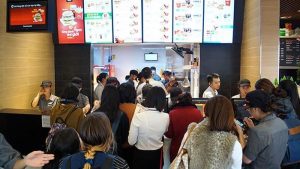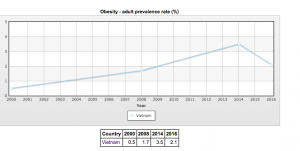Due to my experience growing up in the emerging fast food industry period in Vietnam. Nutritionism is not only the problem in the United States but also in developing countries, Southeast Asia, Vietnam.
Recently, Vietnam’s first McDonald’s restaurant officially opened in 2014, a vast of people lined up to try the most iconic American meal. The McDonald restaurants also offer McPork to carter to Vietnamese taste. How wonderful it is!

The first McDonald’s brand open in Ho Chi Minh city, and people wait in a queue, up to 1-2 hours to try the most iconic American meals. Source: Vietnamnews.vn
In the book In Defense of Food by Michael Pollan addresses the nutritionism in the United States. Hence, the growth of Western fast-food chain is predictable that the nutritionism will be a problem in Vietnam, whether Vietnamese will be eager to substitute for the culinary classic such as pho and banh mi with Big Macs and McPork. However, I hope I won’t be considered presumptuous when I said the growth of fast food restaurants contribute to the rising of obesity, diabetes, and other diseases diet-related in Vietnam.

Source: Statistic from indexmundi
Coincidently, the prevalence rate suddenly peaks in 2014, when the first Mc’s Donald established in Vietnam. Even though Vietnamese government has taken action aim at obesity intervention, it is not effective. Historically, after so many decades fighting famine, medical staffs and policymakers have no prior experience in treating over-nutrition diseases, as well as financial unstable in health care system. However, responding individually to the obesity crisis without solving the problem from the roots is a temporary solution. In the fight against obesity, offering obesity/ diabetes training program in treating diseases for medical personnel and patients to follow the treatment plan, stabilize health care budget to provide insulin treatments, and using social media as a useful tool to increase people awareness. Thus, everybody needs to come together, engage, and fight to obesity-related illness. It is not too late for Vietnam to say no.

Sammy, your blog post reminded me of my home country, Myanmar, as it is also a nation that is already seeing the growth of the fast food industry as international sanctions were lifted back in 2017. Even back during the isolation period of Myanmar, we don’t often see any of the U.S fast food industry penetrating into my home country but we saw a lot of Asian (especially Korean fast food chain) such as Lotteria, which now have over 20 branches throughout the country. As U.S began to lift their economic sanctions, we started seeing chains such as KFC and Pizza Hut to join Myanmar back in 2015. So it seems like the Burmese fast-food industry is beginning to look at lot more like Vietnam.
As for the fast-food culture catching up in Myanmar, price and taste is really what will set apart from Burmese people to be giving up their own ethnic food over KFC or Pizza. KFC is not doing so well since we Burmese people don’t have a large middle class as compared to Vietnam in which they can spend $5 on fried chicken when they can just go out to the streets and get $1 fried chicken. Also KFC in Myanmar is not doing so well because the franchisor is from Singapore and they have menu that caters to the Singaporean taste buds. If they were to bring the menu that is closer to home, such as the Thai menu, in my opinion they would do a way lot better than now. Also KFC supply chain in Myanmar is struggling to keep up to have chicken that are up to international standards, and due to this reason the cost of the chicken is higher when compared to other industries in other SEA countries. Challenges that would include in Myanmar for example is the government can’t provide enough electricity to even run within the city, thus entailing a lot of power cuts so this would incur high electricity cost for KFC to run their generators most of the weeks.
Myanmar is going to be an interesting case in terms of how much the fast food industry is going to thrive or not. With a population that has been so long isolated for the 60+ year of military dictatorship, and due to that a slow growing middle class, and with the high cost of international franchise to operate, I don’t think fastfood culture and industry will move as fast as Vietnam.